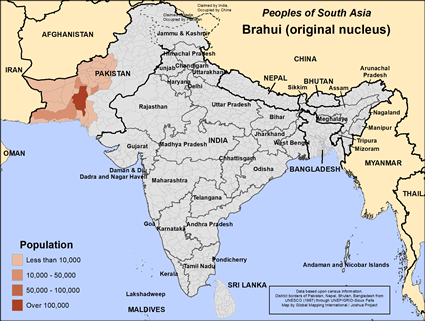Brahui (original nucleus) in Pakistan

Send Joshua Project a photo
of this people group. |

Map Source:
People Group data: Omid. Map geography: UNESCO / GMI. Map Design: Joshua Project
|
| People Name: | Brahui (original nucleus) |
| Country: | Pakistan |
| 10/40 Window: | Yes |
| Population: | 525,000 |
| World Population: | 525,000 |
| Primary Language: | Brahui |
| Primary Religion: | Islam |
| Christian Adherents: | 0.00 % |
| Evangelicals: | 0.00 % |
| Scripture: | New Testament |
| Ministry Resources: | Yes |
| Jesus Film: | Yes |
| Audio Recordings: | Yes |
| People Cluster: | Brahui |
| Affinity Bloc: | South Asian Peoples |
| Progress Level: |
|
Introduction / History
The Brahui rose to power by overthrowing a dynasty of Hindu kings in the 1600s. Under Nasir Khan in the 1700s, the confederacy reached its peak. Today, the Brahui are made up of 29 tribes. Eight of those tribes form what is believed to the original Brahui nucleus.
Brahui can be distinguished from their Pushtun and Baluchi neighbors by their Dravidian language, called Brahuidi. Linguists have not been able to discover the link between the Brahui and other speakers of Dravidian languages who live 1000 miles away in southern India. Their language, Brahui, has three main dialects. In today's world, they are often borrowing words from their more powerful neighbors, the Baloch and the Sindhis.
Most of them live in the eastern part of Balochistan, Pakistan's westernmost province, near Sindh Province. There are 29 Brahui peoples, eight of which are peripheral, meaning they are not part of the original group. The others are loosely called "nucleus."
What Are Their Lives Like?
For years, most Brahui were nomadic shepherds who traveled between the highlands and the lowlands in search of proper temperatures, rainfall and pasture for their flocks. During the cold and icy winter months, the Brahui lived in the plains. They return to the hills only after the lambs are born in February or March.
The number of Brahui nomads has consistently declined over the past hundred years, and today there are many fully settled villages dependent on underground water irrigation to raise the numerous cash crops. There are a number of towns that serve as administrative and commercial centers, although relatively few Brahui live in town year round.
The Brahui shepherds have organized themselves into groups of cooperating households known as khalks. Each khalk combines its herds into one flock under the care of a professional resident shepherd. The resident shepherd controls up to 500 sheep. This procedure benefits the Brahui economically because it allows the men and their adult sons to work on local village farms in exchange for wheat. Having one resident shepherd also enables the men to take their herds to market for sale and to exchange information with other Brahui about the locations of various camps and flocks.
Through the use of khalks, Brahui have become expert shepherds. They have learned the optimum number of sheep that can be grazed together. They also have discovered that sheep are not happy in very small groups, and that they spread and wander under such conditions. When the herds increase to more than 500 animals, leaders "multiply" the group, shifting the tents to form a new khalk.
Families arrange their marriages. Fathers prefer their sons to marry a cousin on the father's side, although, occasionally, families will consider the wishes of the couple. Men may take multiple wives, but the expenses incurred tend to limit this practice. Divorce is rare among the Brahui. The ideal family consists of married sons who live with their parents. After the father's death, brothers continue to live together with a united family estate under the leadership of the eldest son.
The tribe is the basic political unit of the Brahui. Tribes base their membership on patrilineal descent (common male ancestors) and political allegiance.
What Are Their Beliefs?
The Brahui are Sunni Muslims who believe that the supreme God, Allah, spoke through his prophet, Mohammed, and taught mankind how to live a righteous life through the Koran and the Hadith. To live a righteous life, you must utter the Shahada (a statement of faith), pray five times a day facing Mecca, fast from sunup to sundown during the month of Ramadan, give alms to the poor, and make a pilgrimage to Mecca if you have the means. Muslims are prohibited from drinking alcohol, eating pork, gambling, stealing, slandering, and making idols. They gather for corporate prayer on Friday afternoons at a mosque, their place of worship.
The two main holidays for Sunni Muslims are Eid al Fitr, the breaking of the monthly fast and Eid al Adha, the celebration of Abraham's willingness to sacrifice his son to Allah.
Sunni religious practices are staid and simple. They believe Allah has pre-determined our fates; they minimize free will.
In most of the Muslim world, common people depend on the spirit world for their daily needs since they regard Allah as too distant. Allah may determine their eternal salvation, but the spirits determine how well they live on a daily basis. For that reason, some Muslims appease spirits using charms and amulets to help them with spiritual forces. More orthodox Muslims consider these practices heretical and un-Islamic.
What Are Their Needs?
The Brahui peoples need to put their trust and identity in the only one who can save them, Jesus Christ. Until that time, they will suffer spiritually.
Prayer Points
Pray for many Brahui to understand both God's judgment and his majestic glory.
Pray for loving workers to go to the Brahui people, and for their hearts to be ready to receive their savior.
Pray for a chain reaction of families reaching families that result in thousands of new disciples who share their faith with others.
Pray for grace and truth expanding into their entire society as all believers learn to love others.